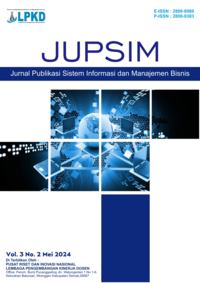Pengaruh Kecerdasan Emosional Stres Kerja dan Kepuasan Kerja terhadap Kinerja Karyawan pada Perusahaan
DOI:
https://doi.org/10.55606/jupsim.v4i2.5229Keywords:
Emotional Intelligence, Job Satisfaction, Job Stress, Employee Performance, ProductivityAbstract
The purpose of this study is to determine the influence of emotional intelligence, job stress, and job satisfaction on employee performance at the Limited Liability Company (PT) Nuansa Dharma Cipta Tanah Grogot. The sample in this study were all employees at PT. XYZ. The sampling technique used was total sampling, so the sample in this study was 33 employees of PT. XYZ. The results of multiple linear regression analysis obtained a regression equation, namely: Y = -8.074 + 0.875X1 + 0.092X2 + 0.152X3. The correlation coefficient (R) value is 0.965, which means a very strong correlation between emotional intelligence (X1), job stress (X2), and job satisfaction (X3) on employee performance (Y) at PT. XYZ. The coefficient of determination (Adjusted R2) of 0.925 or 92.5% indicates the significant contribution of Emotional Intelligence (X1), Job Stress (X2), and Job Satisfaction (X3) to Employee Performance (Y). The remaining 7.5% is explained by other variables not included in this study. The results of the simulants test (F test) show that the calculated F value > F table (131.862 > 2.93) so it can be concluded that together Emotional Intelligence (X1), Work Stress (X2), and Job Satisfaction (X3) have an effect on Employee Performance (Y) at PT. XYZ. Furthermore, a partial test was conducted by looking at the calculated t value of each variable consisting of Emotional Intelligence (X1), Job Stress (X2), and Job Satisfaction (X3) of 13.059, 3.370, and 5.178 respectively, which when compared with the t table of 2.04523, Emotional Intelligence (X1), Job Stress (X2), and Job Satisfaction (X3) have an individual effect on Employee Performance (Y) because the calculated t value > t table, then the Job Stress hypothesis (X2) is not proven to be dominant because the value of Emotional Intelligence (X1) is greater, which means that Emotional Intelligence (X1) has a dominant effect on Employee Performance (Y) at PT. XYZ.
References
Dewi, R. R., et al. (2021). Manajemen sumber daya manusia: Suatu pengantar. Solok: Insan Cendikia Mandiri.
Febrianty, M., Cand, M., & Sentanu, I. G. E. P. S. (2023). Kepemimpinan: Bukan sekedar menjadi pemimpin. Tasikmalaya: PRCI.
Firmansyah, M. A., & Mahardhika, B. W. (2018). Pengantar manajemen. Yogyakarta: Budi Utama.
Goleman, D. (2020). Emotional intelligence: Improve your social skills and emotional agility for a better life, success at work and happier relationships. Discover why it can matter more than IQ (EQ 2.0).
Ikut, C. I. (2023). Manajemen sumber daya manusia: Analisis tentang prestasi kerja, produktivitas kerja dan kinerja karyawan. Semarang: STIEPARI Press.
Machali, I. (2021). Metode penelitian kuantitatif: Panduan praktis merencanakan, melaksanakan dan analisis dalam penelitian kuantitatif. Yogyakarta: FITK UIN Sunan Kalijaga.
Nggiri, M. M., Sedyastuti, K., & Puspitosari, A. A. (2024). Pengaruh kecerdasan emosional, stres kerja dan kepuasan kerja terhadap kinerja karyawan Kantor Pengawasan dan Pelayanan Bea Cukai Type Madya Cukai Kota Malang. Jurnal Ekonomi dan Manajemen, 3(2). https://doi.org/10.56127/jekma.v3i2.1419
Pratama, Y., et al. (2023). Pengembangan sumber daya manusia. Purbalingga: Eureka Media Aksara.
Priyatno, D. (2010). Paham analisa statistik data dengan SPSS. Yogyakarta: Mediakom.
Purwanza, S. W., et al. (2020). Metodologi penelitian kuantitatif, kualitatif dan kombinasi. Bandung: Media Sains Indonesia.
Qomariah, N. (2020). Manajemen sumber daya manusia: Teori, aplikasi dan studi empiris. Jember: Pustaka Abadi.
Rahmadani, S., Moenis, A., & Yulasmi. (2020). Kinerja karyawan ditinjau dari kepuasan kerja, kecerdasan emosional, dan stres kerja. Jurnal Informatika Ekonomi Bisnis, 2(1). https://doi.org/10.37034/infeb.v2i1.14
Rezeki, F., et al. (2020). Manajemen sumber daya manusia dalam organisasi. Bandung: Media Sains Indonesia.
Rohman, M. M., et al. (2023). Metode penelitian kuantitatif dan kualitatif. Yogyakarta: Penamuda Media.
Sadikin, A., Misra, I., & Hudin, M. S. (2020). Pengantar manajemen dan bisnis. Yogyakarta: K-Media.
Silaen, N. R., et al. (2021). Kinerja karyawan. Bandung: Widina Bhakti Persada.
Simamora, M. (2024). Pria di Jakut bunuh diri diduga stres kerja, tinggalkan surat wasiat untuk istri. Kumparan News, (26). https://kumparan.com/kumparannews/pria-di-jakut-bunuh-diri-diduga-stres-kerja-tinggalkan-surat-wasiat-untuk-istri-1xlBa25a9NQ
Sugiyono. (2023). Metode penelitian kuantitatif, kualitatif dan R&D. Bandung: Alfabeta.
Sujarweni, W. (2021). Metodologi penelitian: Lengkap, praktis, dan mudah dipahami. Yogyakarta: Pustaka Baru.
Suryani, & Hendryadi. (2015). Metode riset kuantitatif: Teori dan aplikasi pada penelitian bidang manajemen dan ekonomi Islam. Jakarta: Prenadamedia Group.
Suryani, N. K., et al. (2020). Kinerja sumber daya manusia: Teori, aplikasi, dan penelitian. Bandung: Widina Bhakti Persada.
Toko Nuansa. (2025). Tokonuansa.com sahabat berbelanja online Anda. Tokonuansa.com. http://www.tokonuansa.com/
Yuniarti, R., et al. (2021). Kinerja karyawan (Tinjauan teori dan praktis). Bandung: Widina Bhakti Persada.
Downloads
Published
How to Cite
Issue
Section
License
Copyright (c) 2025 Jurnal Publikasi Sistem Informasi dan Manajemen Bisnis

This work is licensed under a Creative Commons Attribution-ShareAlike 4.0 International License.







